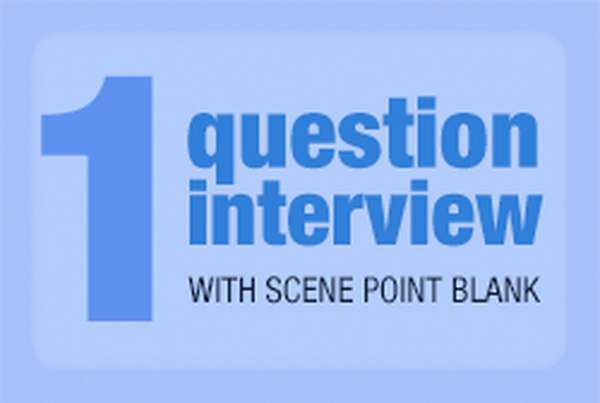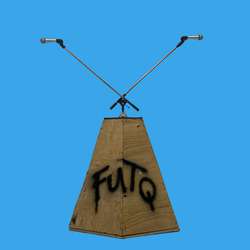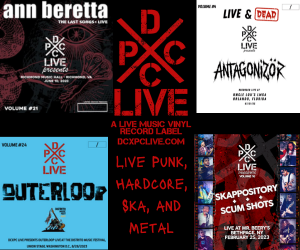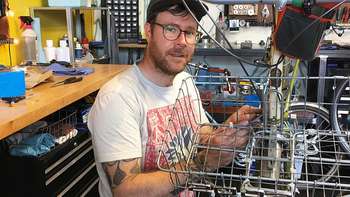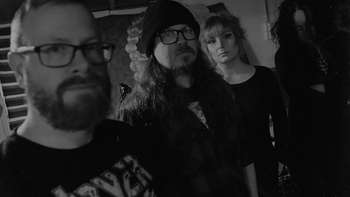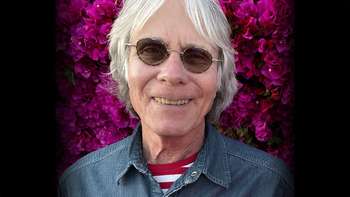In 2020 I spent a lot of time online -- we all did. I also spent a lot of time emailing with Shellshag, which we eventually decided to turn into a full-on interview. Part one, already published, takes a deep look at the digital streaming model and proposes that band’s take back what is theirs.
Part two keeps a finger on that pulse, but also moves toward what the duo Shellshag is up to right now, musically. They just released FUTQ and we wanted to get a look behind the making of their most recent full-length.
The record is available from the band here.
Scene Point Blank: Now that my review has published and I took my own stab at it, I'd rather hear your own description. You cover a lot of ground musically: How do you describe Shellshag's sound to strangers?
Shellshag: We often say to come to a show and go on to describe our sound as minimal, with no bass drum or bass player, which is specifically accurate. We have never known how to describe our sound to others, except to say that one needs to hear both recordings and see a live show to understand us. We liked how you described us, and maybe descriptions belong to listeners and not the band itself.
Scene Point Blank: The new record really varies from track to track, from noisy stuff like the Fleshies split to soft duets. Is that intentional, or how does your writing process work? Did you begin work on FUTQ with a specific mood or theme?
Shellshag: FUTQ is unlike all other Shellshag records we have released. We recorded it ourselves, very lo-fi, and with more freedom and less expectation than the previous albums. We did not start with a specific goal, but we were recording at home between tours and the album revealed itself. We had been using the phrase “follow up the quest,” a quote from Lord Alfred Tennyson’s Idylls of the King, for inspiration on the road. That quickly became the title of the album and the song followed shortly. We committed to releasing the album when Mike Watt invited us to premiere it on The Watt From Pedro Show in July 2020. We really love how different it is from our other albums.

Photo by Bryan Lasky
Scene Point Blank: Because you mix it up so much, how important is production and sequencing when you put together a record? Obviously I like the ideas and songs, but I imagine putting it together into a package is a challenge to create a comprehensive piece.
Shellshag: It is really important to us. We like to make albums, and that means the running time, the sequence, the title, the art, all of it. It has to work as a collection and we make changes, add or take away until we are happy with the entire album. If we are recording a song, knowing it is a single, that is different. We have done several 7" vinyl releases, some that are splits with other bands, and those are like mini albums. It really comes down to the vinyl representation for us. We love to make an album, with all things considered.
We let the process run its coarse and continue the conversation between us and the music we are making until we are ready to move on, knowing that it’s never really finished. Eventually it just becomes time to move on.
Scene Point Blank: Do you have any specific examples of challenges or techniques you used in sequencing FUTQ, like a song you kept moving to a different part of the album or a transition you had to rework?
Shellshag: We have 5 or 6 songs that do not appear on FUTQbecause we decided that those songs were the start of our next record. Before we made that decision we went back and forth on including them or not, and that process pushed the order around some. After listening to the tracks in a few different sequences, we found we were most comfortable with the original order. This happens a lot, and even we are never sure if it is because we had become used to the tracks in that order, or if it is genuinely the best sequence for the record. Like we said above, eventually it just becomes time to move on. We are happy with the sequence, we have not wanted to change it since the digital version was put online, so the sequence will remain the same on the vinyl. We are also excited to be half way into our next release, The Other Side.
"Our goal is not to go from point A to point B. We are not looking to get anywhere, we are exactly where we want to be. We exist. So when we follow up the quest, it’s not to continue to get where we are going, it is to continue to have an impact from where we already are."
Scene Point Blank: Continuing that theme, which is really focused on the concept of an album, how has the changing landscape for music platforms changed your approach? Do you think about how people might experience the record or individual songs? A full play on vinyl is obviously different than a song on YouTube or whatever.
Shellshag: It has changed things quite a bit. The most notable way it has changed things for us is the individual song sharing.
We have never “released” a single song, although we have “shared” a single song. We try to be patient and refrain from sharing the music for an album one song at a time or before it is mixed and mastered. It gets harder and harder to be patient as we become use to the instant gratification of online sharing. The possibilities are becoming responsibilities.
Sharing songs online is not making an album, or even a single. It is just sharing songs online. We sometimes find ourselves wanting to share some songs the day we write them or record them, but we try to maintain discipline. Patience and discipline are more important to us now that technology allows us to move much quicker.
Scene Point Blank: Where did "Follow Up The Quest" come from? You source the quote on your Bandcamp, so I know it's based on Alfred Lord Tennyson. Was the quote a direct inspiration or something more subtle where you connected the dots after writing?
Shellshag: Yes, it is from Lord Alfred Tennyson’s Idylls of the King, and we use the phrase as inspiration and a reminder that our goal is not to go from point A to point B. We are not looking to get anywhere, we are exactly where we want to be. We exist. So when we follow up the quest, it’s not to continue to get where we are going, it is to continue to have an impact from where we already are. Despite day, night, death and hell. I guess in a way, hell has become the word that represents the current acceptance of this corporate money-making system. So we continue despite that, wondering, what happened to Fuck the Man, Fuck Society, and Selling Out? We are choosing to stay in the underground, feeling alone enough to fear that it know longer exists.
Scene Point Blank: Has 2020 and COVID-19 changed how you released the album?
Shellshag: A little. Since we have to wait a bit longer to be able to tour, we have time to be patient on the production of the vinyl which -- make no mistake -- is the album. The digital representation of that album has been up since we premiered it on The Watt From Pedro Show, and the album will be ready in January. The cover art for FUTQ of our amp boarded shut and closed was chosen because of the closing of our world this year.
Scene Point Blank: Has the current situation changed how you view any of the songs in particular?
Shellshag: Definitely. The pandemic and the uprising have given an entirely new meaning to the phrase "Follow up the quest." It immediately reached beyond how we see the phrase and showed its power in inspiring any quest. We are all on a quest, what is yours?

Photo by Jim Appio (Cool Dad Music)
Scene Point Blank: I've listened to the record a lot and enjoy it quite a bit.
In the digital era I miss lyric sheets. Can you tell me a bit about "Pretty Ugly?" What does that song mean to you?
Shellshag: Thanks, glad you are enjoying it. Ha! "Pretty Ugly." That one has a little background. We spend a lot of our time around people half our age, but we rarely notice a difference between us and everyone else. Those rare moments when life reminds us that we are no longer in our twenties, can be moments that leave us feeling pretty ugly.
You mention lyric sheets, and we like those too, so we put the lyrics with the songs at YouTube, here is the link to Pretty Ugly.
Scene Point Blank: I'm also curious about the story behind "Jack Robinson." While I suspect it's irrelevant, the name reminds me of an important historical baseball player when I hear it...
Shellshag: Yes!! So glad you asked about this!!
So this song happened like this:
We wanted to write a song using as a topic phrases like, “We’ll be finished before you can say ______,” or, “I’m not far from your house, so I'll be there before you can say ‘when.’” Many variations popped into our head.
So we looked up the origin of “Before you can say (something).” As it turns out, the original phrase was “Before you can say Jack Robinson” and, sometimes, “Before you can say knife.” The entire phrase is “I’ll take the money and run away before you can say Jack Robinson.” We also recognize the name as the legendary baseball player, but we learned that before Number 42 changed baseball and the world, Jack Robinson was a name used to represent quickness. Supposedly, an English gentlemen of the early nineteenth century named Jack Robinson was a person who changed his mind. A person had to be quick to catch him in a decision. From there we decided to use only the original phrases and make the song about how fast we would leave a show or a party.
Scene Point Blank: To come full circle, I started by asking about the record's theme or inspiration. As a band that's been around for a while, do you consciously write new material thinking of how your past work might affect people's takeaway, or do you write mostly for you?
Shellshag: We do both. Our awareness that someone somewhere will listen to a song or album has, at times, had an effect on what we decide to say and how we say it. There are endless reasons to create, but those reasons do not have to be constricted by what we assume will be someone’s reaction. First, create. Second, share. Or don’t share. If we are not happy with the music, we would not make it available for others to hear. Some things aren’t meant to be shared, that doesn’t mean they aren’t worth creating.



